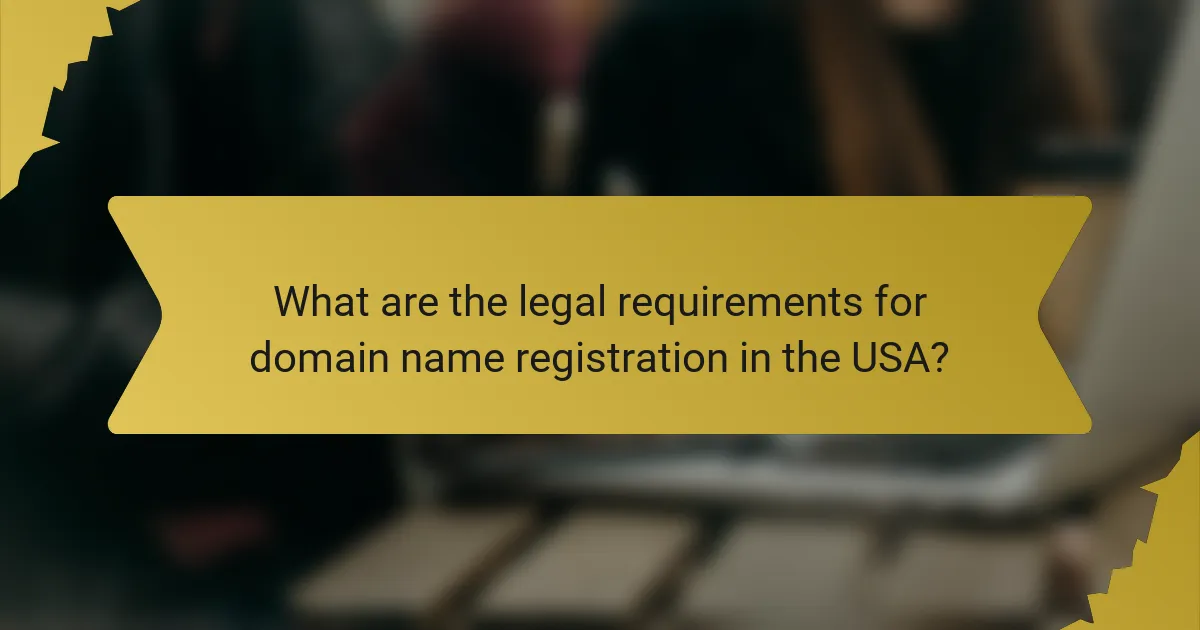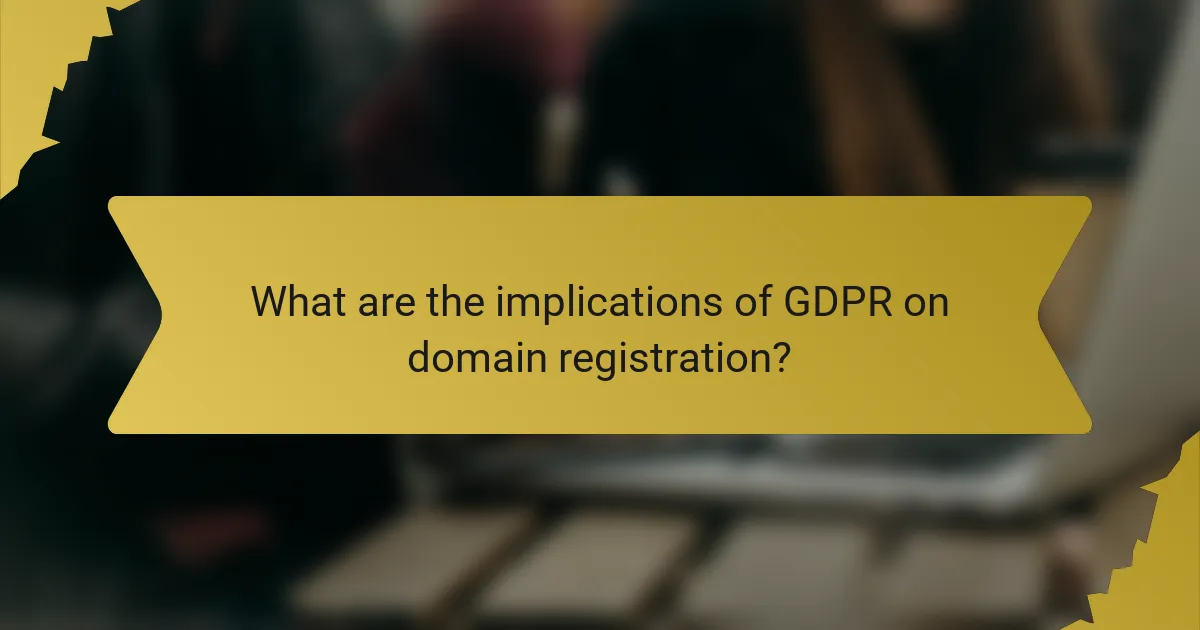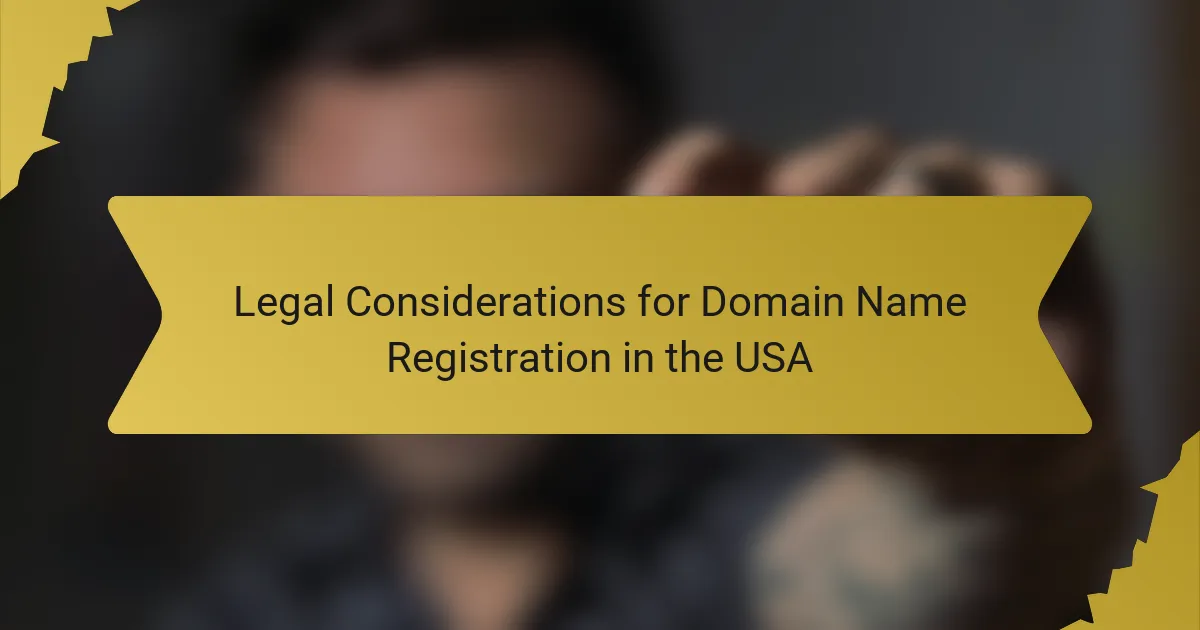When registering a domain name in the USA, it is essential to navigate a complex landscape of federal laws, ICANN regulations, and state laws. Ensuring that your chosen domain name does not infringe on existing trademarks and is unique can help prevent legal disputes and establish a solid online presence. Being aware of potential ownership and trademark rights issues is crucial for avoiding conflicts and ensuring a smooth registration process.

What are the legal requirements for domain name registration in the USA?
In the USA, domain name registration requires compliance with federal laws, regulations from the Internet Corporation for Assigned Names and Numbers (ICANN), and any applicable state laws. Understanding these legal requirements is essential to avoid disputes and ensure a valid registration.
Compliance with the ACPA
The Anticybersquatting Consumer Protection Act (ACPA) protects trademark owners from individuals who register domain names similar to their trademarks with the intent to profit from them. To comply with the ACPA, registrants should avoid names that could confuse consumers or infringe on existing trademarks.
Before registering a domain, conduct a thorough trademark search to ensure that your chosen name does not violate the rights of existing trademark holders. This proactive approach can help you avoid potential legal disputes and costly litigation.
ICANN regulations
ICANN oversees domain name registrations and has established rules that registrars must follow. These regulations include providing accurate contact information and maintaining the integrity of the domain name system. Registrants must ensure their information is up-to-date to avoid losing their domain.
Additionally, ICANN requires that domain names be registered for a minimum period, typically one year, with options for renewal. Familiarizing yourself with these regulations can streamline the registration process and prevent future complications.
State-specific laws
In addition to federal laws, various states may have specific regulations regarding domain name registration. These can include laws related to unfair competition, consumer protection, and privacy. It is crucial to research the laws in your state to ensure compliance.
For example, some states may have stricter rules regarding the use of personal information in domain registrations. Understanding these nuances can help you navigate the legal landscape effectively and avoid potential pitfalls.

How to choose a domain name legally?
Choosing a domain name legally involves ensuring that it does not infringe on existing trademarks, is unique, and is available for registration. This process helps avoid legal disputes and establishes a strong online presence.
Avoiding trademark infringement
To avoid trademark infringement, research existing trademarks before selecting a domain name. Use the United States Patent and Trademark Office (USPTO) database to check if your desired name or similar variations are already registered.
Even if a domain name is available, it may still infringe on a trademark if it is confusingly similar to an existing brand. Consider consulting a legal expert if you are unsure about potential conflicts.
Using a unique name
A unique domain name enhances brand identity and reduces the risk of legal issues. Aim for a name that is distinctive and not easily confused with other businesses or websites.
Consider using creative spellings, combining words, or adding prefixes or suffixes to make your domain stand out. This can help establish a memorable online presence while minimizing trademark concerns.
Checking domain availability
Before finalizing your domain name, check its availability through domain registrars. Popular registrars include GoDaddy, Namecheap, and Google Domains, where you can search for available names and variations.
If your preferred domain is taken, consider alternative extensions like .net, .co, or .biz. However, prioritize .com domains when possible, as they are the most recognized and trusted by users.

What are the risks of domain name disputes?
Domain name disputes can arise from various legal issues, primarily involving ownership and trademark rights. Understanding these risks is crucial for anyone registering a domain name in the USA to avoid potential conflicts and legal challenges.
Cybersquatting claims
Cybersquatting occurs when someone registers a domain name that is identical or confusingly similar to a trademarked name with the intent to sell it at a profit. Under the Anticybersquatting Consumer Protection Act (ACPA), trademark owners can file claims against individuals who engage in this practice. To mitigate the risk, ensure your domain name does not infringe on existing trademarks.
Consider conducting a thorough trademark search before registering your domain. This step can help identify potential conflicts and avoid costly legal disputes.
Trademark dilution
Trademark dilution refers to the weakening of a trademark’s distinctiveness through unauthorized use in a domain name. Even if the domain name is not identical to the trademark, it can still lead to claims if it causes confusion among consumers. Businesses should be cautious when choosing domain names that might be similar to well-known brands.
To protect against dilution claims, select a domain name that is unique and does not resemble existing trademarks. This approach not only reduces legal risks but also strengthens your brand identity.
Legal action from brand owners
Brand owners may take legal action if they believe their trademark rights are being infringed upon by a domain name registration. This can include cease-and-desist letters or lawsuits, which can be costly and time-consuming. Being proactive in your domain name selection can help avoid these scenarios.
Always consider the potential for legal action when registering a domain. Consulting with a legal expert in intellectual property can provide valuable insights and help you navigate the complexities of trademark law in the USA.

How to protect your domain name legally?
To protect your domain name legally, consider registering trademarks, implementing domain privacy, and actively monitoring for infringements. These strategies help secure your online identity and prevent unauthorized use of your domain.
Registering trademarks
Registering a trademark for your domain name provides legal protection against unauthorized use by others. This process involves filing an application with the United States Patent and Trademark Office (USPTO) and demonstrating that your domain name serves as a source identifier for your goods or services.
Consider conducting a trademark search before registration to ensure that your desired name is not already in use. This can help avoid potential legal disputes and additional costs associated with rebranding.
Implementing domain privacy
Domain privacy, also known as WHOIS privacy, protects your personal information by replacing it with the contact details of a privacy service. This helps prevent spam and unwanted solicitations while keeping your identity secure from potential infringers.
When registering your domain, check if your registrar offers privacy protection as an add-on service. This small investment can save you from privacy breaches and harassment, especially if your domain name is closely tied to your business.
Monitoring for infringements
Regularly monitoring for domain name infringements is crucial to maintaining your legal rights. Set up alerts for similar domain registrations or unauthorized use of your trademarked name to catch potential issues early.
Consider using online tools or services that specialize in monitoring domain names and trademarks. These services can help you take swift action against infringements, such as sending cease-and-desist letters or pursuing legal action if necessary.

What are the best practices for domain name registration in the USA?
Best practices for domain name registration in the USA include selecting a trustworthy registrar, understanding renewal policies, and keeping your contact information current. These steps help ensure your domain remains secure and accessible over time.
Choosing a reputable registrar
Selecting a reputable domain registrar is crucial for protecting your online presence. Look for registrars accredited by the Internet Corporation for Assigned Names and Numbers (ICANN) and those with positive customer reviews.
Consider factors such as pricing, customer support, and additional services like privacy protection and DNS management. Avoid registrars with hidden fees or poor service records to ensure a smooth registration experience.
Understanding renewal policies
Domain names typically require annual renewal, and understanding the renewal policies of your registrar is essential. Some registrars offer multi-year registration options, which can save you time and potentially money.
Be aware of the renewal rates, as they can differ significantly from the initial registration cost. Set reminders for renewal dates to avoid losing your domain due to oversight.
Keeping contact information updated
Maintaining accurate contact information is vital for domain ownership. Registrars use this information to communicate important updates, including renewal notices and security alerts.
Regularly check and update your email address, phone number, and mailing address in your registrar account. This practice helps prevent unauthorized access and ensures you receive critical notifications regarding your domain.

What are the implications of GDPR on domain registration?
The General Data Protection Regulation (GDPR) significantly impacts domain registration in the USA by imposing strict rules on how personal data is collected, processed, and stored. Registrars must ensure compliance with GDPR when handling the personal information of EU citizens, even if the registration occurs outside the EU.
Data privacy considerations
When registering a domain, data privacy is paramount, especially under GDPR. Registrars must provide clear information about how personal data will be used and obtain explicit consent from individuals whose data is collected. Failure to comply can lead to substantial fines and legal repercussions.
Domain owners should consider using privacy protection services, which can mask personal information in the WHOIS database. This helps maintain anonymity while still complying with GDPR requirements. However, it is crucial to ensure that the registrar offers such services and that they align with GDPR standards.
Additionally, domain registrants should regularly review their privacy settings and policies to ensure ongoing compliance. Keeping abreast of changes in data protection laws can help mitigate risks associated with domain registration and personal data handling.
